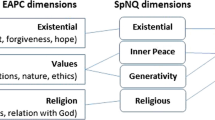Abstract
The introductory chapter addresses indicators of the multilayered construct ‘spirituality’ along with an assessment, and highlights a person-centered approach to ask what could be done to support a person’s spiritual needs. Such an assessment of a person’s spiritual needs in a standardized way does not replace communication, which is the central aspect of spiritual care approaches. It provides a reason to start talking about what is stated as important and unmet. Further, it can be a useful tool for recording and documenting the intensity of unmet needs and can be used for better planning of specific support and treatment. It facilitates learning processes to become more aware of the uniqueness of the person in question.
Access this chapter
Tax calculation will be finalised at checkout
Purchases are for personal use only
Similar content being viewed by others
References
Büssing A (2019) Measuring spirituality and religiosity in health research. In: Lucchetti G, Prieto P, Mario F, Damiano RF (eds) Spirituality, religiousness and health. From research to clinical practice. Springer, Cham, Chapter 2, pp 11–31
Curlin FA, Chin MH, Sellergren SA, Roach CJ, Lantos JD (2006) The association of physicians’ religious characteristics with their attitudes and self-reported behaviors regarding religion and spirituality in the clinical encounter. Med Care 44(5):446–453
Fitchett G (2002) Assessing spiritual needs. A guide for caregivers. Academic Renewal Press, Lima, OH
Koslander T, da Silva AB, Roxberg A (2009) Existential and spiritual needs in mental health care: an ethical and holistic perspective. J Holist Nurs 27:34–42. https://doi.org/10.1177/0898010108323302
Lee E, Baumann K (2013) German psychiatrists’ observation and interpretation of religiosity/spirituality. Evidence-based complementary and alternative medicine, Article ID 280168. https://doi.org/10.1155/2013/280168
Pope Francis (2015) Encyclical letter Laudato si’ of the Holy Father Francis on care for our common home. Libreria Editrice Vaticana, Vatican City. http://www.vatican.va/content/francesco/en/encyclicals/documents/papa-francesco_20150524_enciclica-laudato-si.html. Accesses 21 Aug 2020
Shelly JA (1984) Spiritual needs of children. Scripture Union Publishing, Milton Keynes
Stanworth R (2003) Recognizing spiritual needs in people who are dying. Oxford University Press, Oxford
Suzuki S (2006) Zen Mind, Beginner’s Mind. Shambhala, Boulder
Author information
Authors and Affiliations
Corresponding author
Editor information
Editors and Affiliations
Rights and permissions
Copyright information
© 2021 The Author(s), under exclusive license to Springer Nature Switzerland AG
About this chapter
Cite this chapter
Büssing, A. (2021). Introduction. In: Büssing, A. (eds) Spiritual Needs in Research and Practice. Palgrave Macmillan, Cham. https://doi.org/10.1007/978-3-030-70139-0_1
Download citation
DOI: https://doi.org/10.1007/978-3-030-70139-0_1
Published:
Publisher Name: Palgrave Macmillan, Cham
Print ISBN: 978-3-030-70138-3
Online ISBN: 978-3-030-70139-0
eBook Packages: Religion and PhilosophyPhilosophy and Religion (R0)



